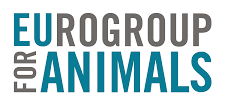
Together with the French Presidency of the Council of the EU, Eurogroup for Animals, in collaboration with its members Fondation Brigitte Bardot, Welfarm and Compassion in World Farming, today organised the event Animal Welfare and International Trade: Looking into the Mirror.
The conference aimed to discuss the trade dimension of the revision of European legislation on animal welfare, and to show how the approach adopted in "mirror measures", one of the priorities of the French Presidency of the Council, can inject more coherence between the EU trade policy and the Green Deal, in particular with regard to animal welfare and the “Farm to Fork” strategy.
“Animal welfare is not properly considered in the framework of trade law, yet, it’s a crucial field when we discuss reciprocity”, said the French Minister for Agriculture and Food Julien Denormandie in his introductory remarks. “For the end of 2023 we’re expecting a legislative proposal on animal welfare in the context of the Farm to Fork strategy, and I believe it is essential for it to include a reciprocity component”, he added.
“Whilst facing huge global challenges, the EU can lead the way towards a truly sustainable and humane food system and trade policy. We believe that the mirror clauses represent a very good mechanism to support this transition. If the EU wants to become a truly sustainable producer and live up its reputation as leader in animal welfare, it is of utmost importance to revise the animal welfare acquis and this can only be done if our standards also apply to imported products. The concept of mirror clauses fits perfectly within this context and we thank the French government for being so persistent”, added Reineke Hameleers, CEO of Eurogroup for Animals.
After Philip Lymbery, CEO of Compassion in World Farming, closed the introductory remarks, three speakers set the stage for the discussions: Stéphanie Ghislain, Eurogroup for Animals, opened on the interconnections between international trade and animal welfare; Lucie Carrouée from DG SANTE elaborated on the discussions around the trade dimension in the current revision of the European legislation on animal welfare; and finally, Clémentine Baldon, lawyer at the Paris Bar, argued that, from a legal perspective, imposing new animal welfare standards on imports could be compatible with the rules of the World Trade Organisation (WTO).
During the panel discussion, Marie-Pierre Vedrenne MEP, vice-chair of the European Parliament INTA Committee, supported the idea: “Reciprocity is an essential topic, in line with strong and necessary demands from civil society, but also from farmers, because it fits with an objective of coherence between public policies.” She also rightly underlined the key challenge of implementing such rules, “An issue that will keep us busy is the implementation of this objective of reciprocity”, confirming it will be an important topic for the European Parliament.
“Consumers are in favour of international trade as long as there is no race to the bottom in terms of regulations, and they can’t imagine that imported products do not respect the rules applied in the EU. 93% of EU citizens demand that trade policy reflect European norms, including on animal welfare”, explained Monique Goyens, CEO of BEUC.
“WTO rules can be a hurdle but it’s not impossible. We have a case-law very clear on that and on the conditions that have to be met. When there is a moral concern, we can of course legislate and we’ll be doing this in a number of areas”, indicated Iciar Chavarri-Ureta, Deputy Head of the Agriculture, Food and Sanitary and Phytosanitary Matters Unit in DG Trade.
The event was also the occasion to launch the new report Bye Bye cages, by Eurogroup for Animals and Compassion in World Farming, on the legality of an EU ban on the sales of meat and eggs produced from caged animals including imported food.
Posted on 2022-03-16 09:38








Comments